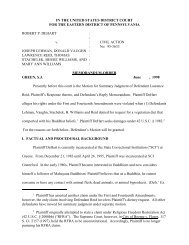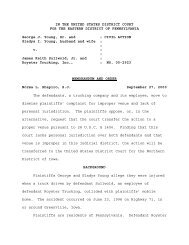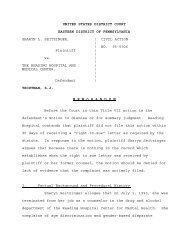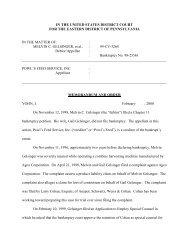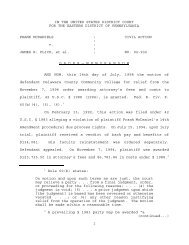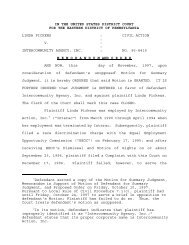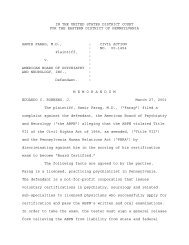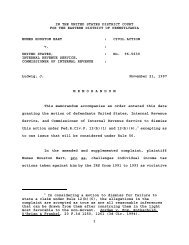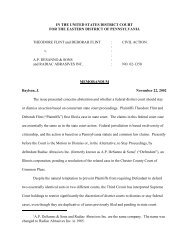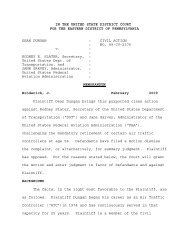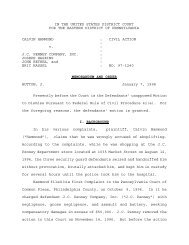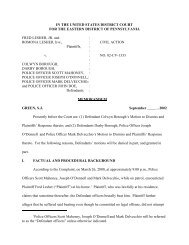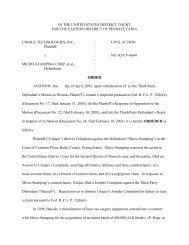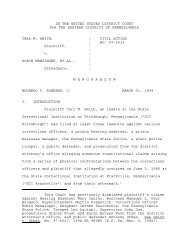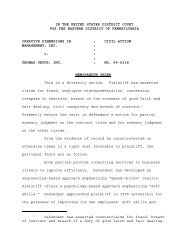civil action - Eastern District of Pennsylvania
civil action - Eastern District of Pennsylvania
civil action - Eastern District of Pennsylvania
Create successful ePaper yourself
Turn your PDF publications into a flip-book with our unique Google optimized e-Paper software.
IN THE UNITED STATES DISTRICT COURT<br />
FOR THE EASTERN DISTRICT OF PENNSYLVANIA<br />
WARE COMMUNICATIONS, INC. : CIVIL ACTION<br />
:<br />
:<br />
v. :<br />
:<br />
RODALE PRESS, INC. : NO. 95-5870<br />
MEMORANDUM AND ORDER<br />
HUTTON, J. January 23, 2002<br />
Presently before the Court are Defendant’s Motion to<br />
Preclude Introduction <strong>of</strong> Evidence <strong>of</strong> Damages, Plaintiff’s Motion in<br />
Limine to Preclude Defendant from Introducing Testimony <strong>of</strong> Candice<br />
Jones and Defendant’s response thereto. For the reasons discussed<br />
below, Defendant’s Motion to Preclude Introduction <strong>of</strong> Evidence <strong>of</strong><br />
Damages is GRANTED, and Plaintiff’s Motion in Limine to Preclude<br />
Defendant from Introducing Testimony <strong>of</strong> Candice Jones is,<br />
consequently, DENIED AS MOOT.<br />
I. BACKGROUND<br />
Plaintiff Ware Communications, Inc. instituted the<br />
current <strong>action</strong> on December 15, 1995 by filing a three-count<br />
Complaint for fraudulent misrepresentation, breach <strong>of</strong> contract, and<br />
invasion <strong>of</strong> privacy against Defendant Rodale Press, Inc.<br />
(“Defendant”). Defendant is the publisher <strong>of</strong> books and magazines<br />
on<br />
subjects ranging from fitness, health and active sports to<br />
gardening and crafts. In 1992, Reginald Ware (“Ware”) on behalf <strong>of</strong>
his publishing company, Ware Communications, Inc. (“Plaintiff”),<br />
approached Defendant with an idea for a healthy lifestyle magazine<br />
geared towards African-American women. In December <strong>of</strong> 1993, the<br />
parties entered into an Advertising Representative Agreement for<br />
the publication known as Rodale’s Heart & Soul.<br />
This agreement<br />
granted Defendant the right to terminate the contract upon thirty<br />
(30) days notice if advertising sales for Heart & Soul did not meet<br />
budget projections. On July 25, 1995, executives from Rodale Press<br />
met with Ware to advise him that Defendant was terminating the<br />
Agreement in the required thirty days. Ware was advised not only<br />
<strong>of</strong> the magazine’s failure to meet budget projections, but also <strong>of</strong><br />
sexual harassment allegations that had been brought against him by<br />
an employee <strong>of</strong> Defendant.<br />
The case was originally brought in this <strong>District</strong> before<br />
the Honorable Robert S. Gawthrop, III. By the time <strong>of</strong> trial, both<br />
the fraudulent misrepresentation and breach <strong>of</strong> contract counts had<br />
been dismissed, leaving only Plaintiff’s invasion <strong>of</strong> privacy<br />
charge.<br />
Following the close <strong>of</strong> Plaintiff’s case in chief on<br />
October 5, 1997, the court entered judgment as a matter <strong>of</strong> law in<br />
favor <strong>of</strong> Defendant. The only issue remaining for the jury was<br />
Defendant’s counterclaim based on the sexual harassment allegation.<br />
On October 9, 1997, the jury found in favor <strong>of</strong> Plaintiff and<br />
against Defendant on the counterclaim. Plaintiff then appealed the<br />
trial court’s order dismissing with prejudice Plaintiff’s breach <strong>of</strong><br />
- 2 -
contract <strong>action</strong> to the United States Court <strong>of</strong> Appeals for the Third<br />
Circuit. The Third Circuit then reversed and remanded the breach<br />
<strong>of</strong> contract claim. 1 See Ware v. Rodale Press, Inc., 185 F.3d 864<br />
(3d Cir. June 16, 1999) (Table, No. 98-1623) (unpublished opinion).<br />
On December 16, 1999, Plaintiff filed a third Amended<br />
Complaint alleging breach <strong>of</strong> contract, misappropriation, breach <strong>of</strong><br />
a duty <strong>of</strong> good faith and fair dealing, and breach <strong>of</strong> a fiduciary<br />
duty.<br />
All claims other than the breach <strong>of</strong> contract <strong>action</strong> were<br />
dismissed with prejudice. 2 On June 8, 2000, counsel for Defendant<br />
forwarded to Plaintiff’s counsel a Request for Production <strong>of</strong><br />
Documents and Interrogatories.<br />
Plaintiff’s counsel failed to<br />
respond to Defendant’s request. Defendant then filed a Motion to<br />
Compel on August 24, 2000, approximately one and a half months<br />
after a response was due. Plaintiff’s counsel also neglected to<br />
respond to the Defendant’s motion.<br />
On September 19, 2000, this Court entered an Order<br />
directing Plaintiff to respond to the June 8, 2000 Request for<br />
Production <strong>of</strong> Documents and Interrogatories within fifteen (15)<br />
days. Despite the Court’s Order, Plaintiff failed to respond to<br />
the discovery request within the required time period. Rather, two<br />
1. Specifically, the Third Circuit found that “the <strong>District</strong> Court’s decision<br />
to deny amendment <strong>of</strong> the contract claim does not comport with the liberal<br />
approach to amendment embodied in the Fed. R. Civ. P. 15(a),” and thus<br />
reversed the order dismissing the breach <strong>of</strong> contract claim. See Ware v.<br />
Rodale Press, Inc., at 12-13 (3d Cir. June 16, 1999) (unpublished opinion).<br />
2. At the same time the bulk <strong>of</strong> Plaintiff’s claims were dismissed, Reginald<br />
Ware, originally named as a Plaintiff along with Ware Communications, Inc.,<br />
was dismissed as a party to this suit.<br />
- 3 -
days after the responses were due, Plaintiff sought an extension <strong>of</strong><br />
time. The parties then entered into a Stipulation which extended<br />
Plaintiff’s deadline to provide the requested information until<br />
October 18, 2000. The Stipulation provided that “[s]hould the<br />
Plaintiff fail to provide such full and complete responses, the<br />
parties agree that Plaintiff shall be prohibited from presenting<br />
any evidence in support <strong>of</strong> its claim at the time <strong>of</strong> trial <strong>of</strong> the<br />
within <strong>action</strong>.” See Stipulation (Docket No. 113), filed Oct. 17,<br />
2000, at 4(b). While Plaintiff’s counsel complied with the<br />
October 18, 2000 deadline, the answers and documents provided were<br />
incomplete. Specifically, with respect to damages, the Plaintiff<br />
repeatedly stated that “Plaintiff has not completed its<br />
determination <strong>of</strong> its damages.” See Def.’s Mot. to Preclude, Ex. D,<br />
Def.’s Interrogs., at 10, 11.<br />
After Defendant was unable to obtain more specific<br />
damages information at the deposition <strong>of</strong> Ware, Defendant informed<br />
Plaintiff in a letter dated November 21, 2000 that full and<br />
complete answers to the interrogatories had not been provided.<br />
Plaintiff did not respond to Defendant’s letter. By this Court’s<br />
Order <strong>of</strong> October 21, 2000, discovery was to be completed on or<br />
before January 8, 2001. One year later, on the eve <strong>of</strong> trial,<br />
Plaintiff set forth for the first time the damages calculation in<br />
its pretrial memorandum dated January 7, 2002. Defendant then<br />
- 4 -
filed the instant motion to preclude the evidence from being<br />
introduced at trial, which was set to begin on January 14, 2002.<br />
II. LEGAL STANDARD<br />
Pursuant to Federal Rule <strong>of</strong> Civil Procedure 37(b)(2)(B),<br />
courts are authorized to impose sanctions for discovery violations,<br />
including barring the admission <strong>of</strong> certain evidence.<br />
See In re TMI<br />
Litig., 193 F.3d 613, 721 (3d Cir. 1999); Puricelli v. Houston, No.<br />
Civ. A. 99-2982, 2000 WL 760522, at *16 (E.D. Pa. June 12, 2000).<br />
Whether sanctions are appropriate is within the district court’s<br />
broad discretion over discovery matters. Puricelli, 2000 WL<br />
760522, at *16. Although the exclusion <strong>of</strong> evidence is an extreme<br />
sanction, a trial court's exclusion <strong>of</strong> evidence for failure <strong>of</strong><br />
counsel to adhere to a discovery order “‘will not be disturbed on<br />
appeal absent a clear abuse <strong>of</strong> discretion.’” In re TMI Litig., 193<br />
F.3d at 721 (internal citations omitted); see also Semper v.<br />
Santos, 845 F.2d 1233, 1237 (3d Cir. 1988).<br />
In cases where precluding evidence as a discovery<br />
sanction would be equivalent to a dismissal <strong>of</strong> the case, a district<br />
court should exercise caution. See Poulis v. State Farm Fire and<br />
Cas. Co., 747 F.2d 863, 867-68 (3d Cir. 1984); Doe v. American Red<br />
Cross, Civ. A. No. 90-6734, 1992 WL 122839, at *2 (E.D. Pa. May 28,<br />
1992). In considering whether to impose such sanctions that amount<br />
to dismissal, a district court must balance the following factors:<br />
(1) the extent <strong>of</strong> the party's personal responsibility (as opposed<br />
- 5 -
to that <strong>of</strong> the attorney); (2) the prejudice to the adversary caused<br />
by the failure to respond; (3) the party's history <strong>of</strong> dilatoriness;<br />
(4) whether the conduct <strong>of</strong> the party or the attorney was willful or<br />
in bad faith; (5) the effectiveness <strong>of</strong> alternative sanctions; and<br />
(6) the meritoriousness <strong>of</strong> the claim or defense. See Poulis, 747<br />
F.2d at 868. While all <strong>of</strong> the above factors must be considered by<br />
the court, no one factor is dispositive, and dismissal may be<br />
appropriate even when some <strong>of</strong> the factors are not met. See Hicks<br />
v. Feeney, 850 F.2d 152, 156 (3d Cir. 1988), cert. denied, 488 U.S.<br />
1005, 109 S.Ct. 786, 102 L.Ed.2d 777 (1989).<br />
III. DISCUSSION<br />
Defendant in the instant case seeks to preclude<br />
Plaintiff’s<br />
introduction <strong>of</strong> evidence pertaining to breach <strong>of</strong><br />
contract damages. According to Defendant, “Plaintiff has failed<br />
and/or refused to comply with prior Court Orders to provide full<br />
and complete answers to the Defendant’s discovery, as a result <strong>of</strong><br />
which the Defendant is unable to prepare a defense to Plaintiff’s<br />
claim for damages.” Def.’s Mot. to Preclude at 24. Granting the<br />
requested sanction in the instant case would be tantamount to a<br />
dismissal because it would prevent Plaintiff from proving all <strong>of</strong><br />
the elements necessary to establish a claim for breach <strong>of</strong> contract<br />
under <strong>Pennsylvania</strong> law. 3 Therefore, the Court must apply the Poulis<br />
3. “A cause <strong>of</strong> <strong>action</strong> for breach <strong>of</strong> contract must be established by pleading<br />
(1) the existence <strong>of</strong> a contract, including its essential terms; (2) a breach<br />
<strong>of</strong> a duty imposed by the contract; and (3) resultant damages.” CoreStates<br />
(continued...)<br />
- 6 -
factors to the facts <strong>of</strong> this case.<br />
See U.S. v. 68.94 Acres <strong>of</strong><br />
Land, 918 F.2d 389, 397 (3d Cir. 1990) (applying a more<br />
discriminating balancing test to a trial court's sanction which<br />
constitutes dismissal <strong>of</strong> the <strong>action</strong>); Doe v. American Red Cross,<br />
Civ. A. No. 90-6734, 1992 WL 122839, at *2 (E.D. Pa. May 28, 1992).<br />
A. The Extent <strong>of</strong> Plaintiff’s Personal Responsibility<br />
The first Poulis factor requires the Court to examine the<br />
extent <strong>of</strong> Plaintiff’s personal responsibility for the failure to<br />
respond to discovery requests. Defendant presents no evidence and<br />
makes no allegation that Ware Communications, Inc. was personally<br />
responsible for the delays in this case. Therefore, this factor<br />
does not weigh in favor <strong>of</strong> precluding the damages evidence.<br />
However, Plaintiff’s “‘lack <strong>of</strong> responsibility for their counsel’s<br />
dilatory conduct is not dispositive, because a client cannot always<br />
avoid the consequences <strong>of</strong> the acts or omissions <strong>of</strong> its counsel.’”<br />
Sheppard v. Glock, Inc., 176 F.R.D. 471, 473 (E.D. Pa. 1997)<br />
(quoting Poulis, 747, F.2d at 868).<br />
B. Prejudice to Defendant<br />
Next, the Court must examine the prejudice Defendant<br />
endured from the failure <strong>of</strong> Plaintiff’s counsel to timely comply<br />
with discovery requests. “‘Prejudice’ in the context <strong>of</strong> the Poulis<br />
3. (...continued)<br />
Bank N.A. v. Cutillo, 723 A.2d 1053, 1058 (Pa. Super. Ct. 1999); see also<br />
Kurtz v. Am. Motorists Ins. Co., 1997 WL 117008, at *4 (E.D. Pa. March 12,<br />
1997) (granting summary judgment on breach <strong>of</strong> contract claim since there was<br />
no genuine issue <strong>of</strong> material fact on the issue <strong>of</strong> damages).<br />
- 7 -
analysis does not mean ‘irremediable’ harm, but the extra costs <strong>of</strong><br />
repeated delays and filing <strong>of</strong> motions required by the abusive<br />
behavior <strong>of</strong> the plaintiff.” Sunday v. U. S., Civ. A. No. 89-8374,<br />
1992 WL 221322, at *4 (E.D. Pa. Sept. 3, 1992). Defendant has been<br />
clearly prejudiced by Plaintiff’s counsel’s failure to provide<br />
specific information and documentation concerning the damages<br />
calculation in a timely fashion. These unreasonable delays have<br />
caused Defendant additional expense in the form <strong>of</strong> two motions<br />
filed with the Court, specifically, Defendant’s motion to compel<br />
and the instant motion to preclude evidence at trial.<br />
Moreover, the dilatoriness <strong>of</strong> Plaintiff’s counsel<br />
substantially impeded Defendant’s ability to prepare a full and<br />
complete defense.<br />
Even though Plaintiff finally disclosed a<br />
breakdown <strong>of</strong> its damages calculation in its pretrial memorandum,<br />
Plaintiff has failed to produce supporting documentation.<br />
Moreover, by revealing this information for the first time on<br />
January 7, 2002, Plaintiff deprived Defendant <strong>of</strong> any significant<br />
inquiry into these amounts before the trial was set to begin on<br />
January 14, 2002. “Eventual production is not the same as timely<br />
production.”<br />
Sheppard v. Glock, Inc., 176 F.R.D. 471, 474 (E.D.<br />
Pa. 1997) (quoting Poulis, 747, F.2d at 868). Due to Plaintiff’s<br />
counsel’s extensive delay in providing the information, Defendant<br />
had little more than a week to evaluate and rebut Plaintiff’s<br />
statement <strong>of</strong> damages. Plaintiff’s <strong>action</strong>s have clearly resulted in<br />
- 8 -
prejudice to Defendant. Therefore, this factor weighs in favor <strong>of</strong><br />
precluding the damages evidence.<br />
C. History <strong>of</strong> Dilatoriness by Plaintiff’s Counsel<br />
The third Poulis factor, Plaintiff’s counsel’s history <strong>of</strong><br />
dilatoriness, also weighs strongly in favor <strong>of</strong> precluding the<br />
damages evidence. A review <strong>of</strong> the docket in the instant case<br />
demonstrates Plaintiff’s repeated failures to respond to discovery<br />
requests in a timely fashion despite Defendant’s repeated requests<br />
and Orders <strong>of</strong> this Court. After Plaintiff’s counsel failed to<br />
respond to Defendant’s Request for Production <strong>of</strong> Documents and<br />
Interrogatories issued on June 8, 2000, Defendant filed a Motion to<br />
Compel on August 24, 2000, approximately one and a half months<br />
after a response was due. Not only did Plaintiff’s counsel fail to<br />
respond to the discovery request, but he also neglected to answer<br />
Defendant’s motion to compel. Consequently, on September 19, 2000,<br />
this Court entered an Order granting Defendant’s uncontested motion<br />
to compel and directing Plaintiff to respond to Request for<br />
Production <strong>of</strong> Documents and Interrogatories within fifteen (15)<br />
days.<br />
Despite the Court’s Order, Plaintiff failed to respond to<br />
the discovery request within the required time period. Rather, two<br />
days after the responses were due, Plaintiff sought an extension <strong>of</strong><br />
- 9 -
time. The parties then agreed, by way <strong>of</strong> stipulation, to extend<br />
Plaintiff’s deadline to provide the information until October 18,<br />
2000. The Stipulation specifically provided that “[s]hould the<br />
Plaintiff fail to provide such full and complete responses, the<br />
parties agree that Plaintiff shall be prohibited from presenting<br />
any evidence in support <strong>of</strong> its claim at the time <strong>of</strong> trial <strong>of</strong> the<br />
within <strong>action</strong>.” See Stipulation (Docket. No. 113), filed Oct. 17,<br />
2000, at 4(b). While Plaintiff’s counsel complied with this<br />
deadline, he provided Defendant with incomplete answers regarding<br />
damages,<br />
explaining that “Plaintiff has not completed its<br />
determination <strong>of</strong> its damages.” See Def.’s Mot. to Preclude, Ex. D,<br />
Def.’s Interrogs., at 10, 11. Therefore, by October <strong>of</strong> 2000,<br />
eight months since the lawsuit commenced in this Court, and five<br />
years after the breach <strong>of</strong> contract <strong>action</strong> was originally brought<br />
before a court <strong>of</strong> this <strong>District</strong>, Plaintiff still had not completed<br />
its determination <strong>of</strong> damages. Instead, on the eve <strong>of</strong> trial,<br />
Plaintiff’s provided calculations for its damages claim for the<br />
first time in its pretrial memorandum.<br />
The excessive discovery delays in this case are further<br />
evidenced by the three scheduling orders issued by this Court to<br />
accommodate discovery. The Court’s June 13, 2000 scheduling order<br />
provided five months for discovery, requiring completion by<br />
November 6, 2000. On October 31, 2000, the Court extended the<br />
discovery deadline to January 8, 2001, nearly seven months from the<br />
- 10 -
date the scheduling order was issued. Plaintiff was afforded more<br />
than amble time to seek the discovery necessary to compute its<br />
damages claim. As this Court noted in its May 10, 2001 Order:<br />
In planning their personal discovery schedule,<br />
a party must decide how they will utilize the<br />
various tools available to them. In making<br />
such a decision, the party is fully aware that<br />
discovery shall be completed within the time<br />
limits set by the Court. In the instant case,<br />
the Plaintiff chose not to begin their<br />
discovery until the deadline was upon them.<br />
...The Court finds the Plaintiff's decision to<br />
delay conducting discovery does not constitute<br />
good cause for extending the discovery<br />
deadline and such a ruling does not result in<br />
manifest injustice to the Plaintiff.<br />
See Order Denying Pl.'s Mot. Reconsideration (Docket No. 136),<br />
signed May 10, 2001. Moreover, the Court noted that this case<br />
dates back in this <strong>District</strong> to September <strong>of</strong> 1995. See id. While<br />
the breach <strong>of</strong> contract claim in this <strong>action</strong> was dismissed prior to<br />
the jury trial, there was no question that “these parties were very<br />
familiar with each other and the factual contentions at issue.”<br />
See id. “For that reason, the discovery in this matter should have<br />
been quite simple and straightforward.” Id.<br />
- 11 -
Despite the length <strong>of</strong> time this case has lingered in this<br />
<strong>District</strong>, Plaintiff waited until one full year after the close <strong>of</strong><br />
discovery, and one week prior to trial, to produce a damages<br />
calculation. “Time limits imposed by the rules and the court serve<br />
an important purpose for the expeditious processing <strong>of</strong> litigation<br />
. . . [a] history by counsel <strong>of</strong> ignoring these time limits is<br />
intolerable.” Poulis, 747 F.2d at 868. The in<strong>action</strong> <strong>of</strong><br />
Plaintiff’s counsel in this case demonstrates a history <strong>of</strong><br />
dilatoriness. 4<br />
Therefore, this factor also weighs in favor <strong>of</strong><br />
precluding the damages evidence.<br />
D. Willful and Bad Faith Conduct <strong>of</strong> Plaintiff’s Attorney<br />
Plaintiff’s counsel has demonstrated bad faith in the<br />
instant case by ignoring Defendant’s requests for discovery, by<br />
failing to comply with an Order <strong>of</strong> this Court, and by failing to<br />
abide to the terms <strong>of</strong> a Court-approved Stipulation. Plaintiff’s<br />
counsel consciously decided to ignore Defendant’s initial request<br />
for discovery materials, then neglected to respond to Defendant’s<br />
motion to compel. Plaintiff’s counsel then failed to comply with<br />
the Order <strong>of</strong> this Court mandating a response to Defendant’s request<br />
within fifteen (15) days. Moreover, Plaintiff’s counsel refused to<br />
acknowledge Defendant’s letter informing him that full and complete<br />
4. As the Third Circuit noted in Curtis T. Bedwell & Sons, Inc. v. Int’l<br />
Fidelity Ins. Co., 843 F.2d 683, 694 (3d Cir. 1988), "[i]n Poulis, one failure<br />
to answer interrogatories and a failure to file a pre-trial statement were<br />
sufficient to support a dismissal."<br />
- 12 -
answers on the issue <strong>of</strong> damages had not been provided, as agreed<br />
upon in the Stipulation.<br />
The general failure <strong>of</strong> Plaintiff’s counsel “to supplement<br />
discovery as promised and as required by the Federal Rules . . .<br />
intimates bad faith.” Sheppard v. Glock, Inc., 176 F.R.D. 471, 477<br />
(E.D. Pa. 1997). Based on the age <strong>of</strong> this case, and the numerous<br />
extensions <strong>of</strong> the scheduling order, Plaintiff’s counsel “can hardly<br />
complain that [he] had inadequate time to provide the desired<br />
reports . . .” In re TMI Litig., 193 F.3d 613, 722 (3d Cir. 1999).<br />
Nor can Plaintiff’s counsel claim that the potential exclusion <strong>of</strong><br />
the untimely provided damages evidence “caught him by surprise”<br />
since he agreed to such a sanction in the Stipulation entered into<br />
by the parties in October <strong>of</strong> 2000. See Stipulation (Docket. No.<br />
113), filed Oct. 17, 2000, at 4(b). Plaintiff’s counsel<br />
willfully<br />
delayed disclosing an itemization <strong>of</strong> damages until<br />
January 7, 2002, one year after the close <strong>of</strong> discovery and one week<br />
before the scheduled trial. No excuse has been pr<strong>of</strong>fered for the<br />
excessive procrastination <strong>of</strong> Plaintiff’s counsel. Accordingly,<br />
this<br />
Court finds that the behavior <strong>of</strong> Plaintiff’s counsel was<br />
willful and in bad faith. Therefore, this factor also weighs in<br />
favor <strong>of</strong> precluding the damages evidence.<br />
E. The Effectiveness <strong>of</strong> Sanctions Other Than Dismissal<br />
The fifth Poulis factor requires the Court to evaluate<br />
the appropriateness <strong>of</strong> sanctions other than dismissal <strong>of</strong> the<br />
- 13 -
<strong>action</strong>.<br />
Other possible sanctions in Rule 37 include an order<br />
establishing designated facts in accordance with the claim <strong>of</strong> the<br />
party obtaining the order, Rule 37(b)(2)(A); an order striking out<br />
pleadings or parts there<strong>of</strong>, staying further proceedings until the<br />
order is obeyed, or rendering a judgment by default against the<br />
disobedient party, Rule 37(b)(2)(C); and an order treating as a<br />
contempt <strong>of</strong> court the failure to obey any orders except an order to<br />
submit to a physical or mental examination, Rule 37(b)(2)(D).<br />
See<br />
Sunday v. U.S., Civ. A. No. 89-8374, 1992 WL 221322, at *5 (E.D.<br />
Pa. Sept. 3, 1992). For example, in Poulis, while the Third<br />
Circuit ultimately upheld dismissal <strong>of</strong> the <strong>action</strong>, it suggested<br />
that the preferred sanction would have been "to impose excess costs<br />
caused by such conduct directly upon the attorney, with an order<br />
that such costs are not to be passed on to the client, directly or<br />
indirectly."<br />
Poulis, 747 F.2d at 869. However, as the court in<br />
noted in Sheppard v. Glock, Inc., 176 F.R.D. 471, 478 (E.D. Pa.<br />
1997), “we are not dealing here with a report that was just a few<br />
days late, or with an illness, death, or other family circumstance<br />
which would excuse an attorney's lack <strong>of</strong> punctuality.”<br />
In the instant case, no other sanction will remedy the<br />
prejudice to Defendant. Defendant has been deprived <strong>of</strong> its<br />
opportunity to examine the damages claim in full. Plaintiff<br />
revealed its proposed damages calculation one week before trial was<br />
scheduled to begin. Moreover, Plaintiff neglected to provide any<br />
- 14 -
substantive support for its calculations. Due to Plaintiff’s<br />
inordinate delay, Defendant was not afforded the opportunity to<br />
challenge the data. At this stage in the litigation, it is neither<br />
appropriate nor judicially economical to reopen discovery one year<br />
after its close to allow Defendant appropriate time to investigate<br />
the damages calculation.<br />
See In re Paoli Railroad Yard PCB Litig.,<br />
1992 WL 323675, at *4 (E.D. Pa. Oct. 21, 1992). As previously<br />
stated, this matter has been lingering before courts <strong>of</strong> this<br />
<strong>District</strong> since 1995. Because Plaintiff’s counsel failed to provide<br />
its damage calculation to Defendant until the eve <strong>of</strong> trial, the<br />
only appropriate remedy is to preclude the introduction <strong>of</strong> such<br />
evidence at trial, as Plaintiff counsel agreed to in the Courtapproved<br />
Stipulation.<br />
F. Meritoriousness <strong>of</strong> the Claim<br />
This final Poulis factor requires the Court to evaluate<br />
the merits <strong>of</strong> Plaintiff’s breach <strong>of</strong> contract claim as it would<br />
under a Rule 12(b)(6) motion for failure to state a claim upon<br />
which relief can be granted. Therefore, the Court need only<br />
establish whether "the allegations <strong>of</strong> the pleadings, if established<br />
at trial, would support recovery by plaintiff." Poulis, 747 F.2d<br />
at 869-70.<br />
Under that standard, Plaintiff’s breach <strong>of</strong> contract<br />
- 15 -
claim is meritorious since it previously withstood Defendant’s<br />
motion to dismiss. 5<br />
IV. CONCLUSION<br />
The balance <strong>of</strong> the Poulis factors weighs in favor <strong>of</strong><br />
precluding Plaintiff’s evidence on damages, thereby effectively<br />
dismissing Plaintiff’s breach <strong>of</strong> contract claim against Defendant.<br />
The Court is mindful that the exclusion <strong>of</strong> evidence is an “extreme”<br />
sanction. Sheppard v. Glock, Inc., 176 F.R.D. 471, 473 (E.D. Pa.<br />
1997). However, “[t]he court has authority to employ ‘the most<br />
severe in the spectrum <strong>of</strong> sanctions provided by statute’ to ensure<br />
compliance with its discovery orders and to deter all parties in<br />
5. The Court notes, however, that the damages calculation provided by<br />
Plaintiff on the eve <strong>of</strong> trial is insufficient to warrant a trial on the<br />
merits. See e.g., USA Mach. Corp. v. CSC, Ltd., 184 F.3d 257, 265 (3d Cir.<br />
1999) (finding that plaintiff could not succeed on its contract claims<br />
“because <strong>of</strong> its failure <strong>of</strong> pro<strong>of</strong> with respect to damages”). Under<br />
<strong>Pennsylvania</strong> law, in order to proceed with a breach <strong>of</strong> contract <strong>action</strong>, a<br />
plaintiff must establish “(1) the existence <strong>of</strong> a contract, including its<br />
essential terms; (2) a breach <strong>of</strong> a duty imposed by the contract; and (3)<br />
resultant damages." CoreStates Bank N.A. v. Cutillo, 723 A.2d 1053, 1058 (Pa.<br />
Super. Ct. 1999). In order to prove damages, a plaintiff is required “to give<br />
the factfinder evidence upon which it could base a calculation <strong>of</strong> damages to a<br />
‘reasonable certainty.’” ATACS Corp. v. Trans World Communications, Inc., 155<br />
F.3d 659, 668 (3d Cir. 1998). Reasonable certainty has been defined at a<br />
minimum to include “a rough calculation that is not too ‘speculative, vague or<br />
contingent upon some unknown factor.’” Id. at 669.<br />
In the instant case, Plaintiff failed to provide any supporting<br />
documentation or expert reports or analysis to support its damages<br />
calculations. Plaintiff produced no evidence or documentation concerning<br />
costs and expenses Plaintiff avoided by not having to perform its sales duties<br />
under the contract. Nor has Plaintiff provided the basis for the itemized<br />
advertising commissions. In fact, the damages calculations, as presented,<br />
evince little more than the opinion <strong>of</strong> Reginald Ware. “It is true . . . that<br />
the <strong>Pennsylvania</strong> law <strong>of</strong> contracts allows for some uncertainty in calculating<br />
damages . . .” ATACS Corp., 155 F.3d at 670. However, “[w]hile mathematical<br />
certainty is not required, the plaintiff must introduce sufficient facts upon<br />
which the jury can determine the amount <strong>of</strong> damages without conjecture.”<br />
Delahanty v. First <strong>Pennsylvania</strong> Bank, N.A., 464 A.2d 1243, 1257 (Pa. 1983);<br />
see also Scully v. US WATS, Inc., 238 F.3d 497, 515 (3d Cir. 2001). After<br />
years <strong>of</strong> discovery, Plaintiff in the instant case has failed to present<br />
evidence upon which the factfinder could base a damages calculation to a<br />
reasonable certainty.<br />
- 16 -
this litigation from engaging in discovery misconduct.” In re<br />
Orthopedic Bone Screw Prods. Liab. Litig., 1998 WL 254038, at *4<br />
(E.D. Pa. May 5, 1998) (quoting National Hockey League v.<br />
Metropolitan Hockey Club, Inc., 427 U.S. 639, 643 (1975)) (finding<br />
it was not an abuse <strong>of</strong> discretion to dismiss a case pursuant to<br />
Rule 37 where interrogatories remained substantially unanswered for<br />
seventeen months despite numerous extensions and warnings from the<br />
court, and promises by plaintiffs). In the instant case,<br />
Plaintiff’s utter failure to provide Defendant with a damages<br />
calculation until the eve <strong>of</strong> trial is inexcusable, particularly in<br />
light <strong>of</strong> the repeated requests by Defendant, Orders <strong>of</strong> this Court,<br />
and the excessive length <strong>of</strong> time provided for discovery in this<br />
case. Therefore, the sanction <strong>of</strong> preclusion is warranted.<br />
An appropriate Order follows.<br />
- 17 -
IN THE UNITED STATES DISTRICT COURT<br />
FOR THE EASTERN DISTRICT OF PENNSYLVANIA<br />
WARE COMMUNICATIONS, INC. : CIVIL ACTION<br />
:<br />
:<br />
v. :<br />
:<br />
RODALE PRESS, INC. : NO. 95-5870<br />
O R D E R<br />
AND NOW, this 23 rd day <strong>of</strong> January, 2002, upon<br />
consideration <strong>of</strong> Defendant Rodale Press, Inc.’s Motion to Preclude<br />
Introduction <strong>of</strong> Evidence <strong>of</strong> Damages and Plaintiff’s Motion in<br />
Limine to Preclude Defendant from Introducing Testimony <strong>of</strong> Candice<br />
Jones and Defendant’s response thereto, IT IS HEREBY ORDERED that:<br />
(1) Defendant’s Motion to Preclude is GRANTED;<br />
(2) Plaintiff Ware Communication Inc.’s breach <strong>of</strong><br />
contract claim is DISMISSED;<br />
(3) Plaintiff Ware Communication Inc.’s Motion in Limine<br />
to Preclude Defendant Rodale Press, Inc. from Introducing Testimony<br />
<strong>of</strong> Candice Jones is DENIED AS MOOT.<br />
BY THE COURT:<br />
_____________________________<br />
HERBERT J. HUTTON, J.



